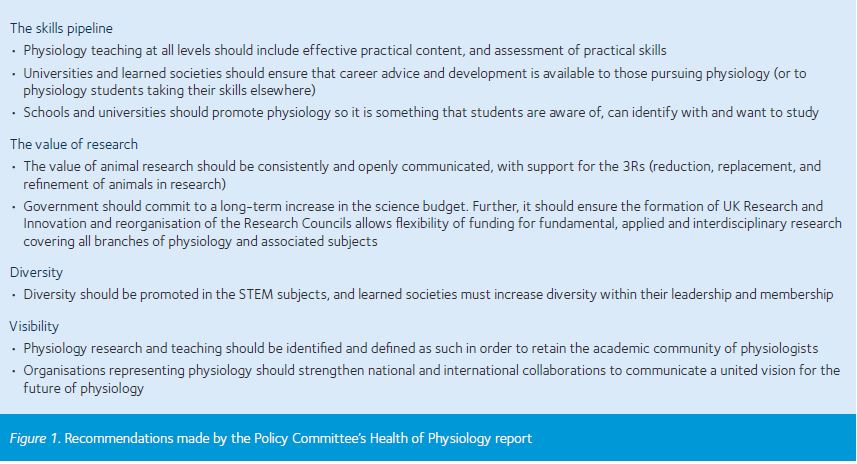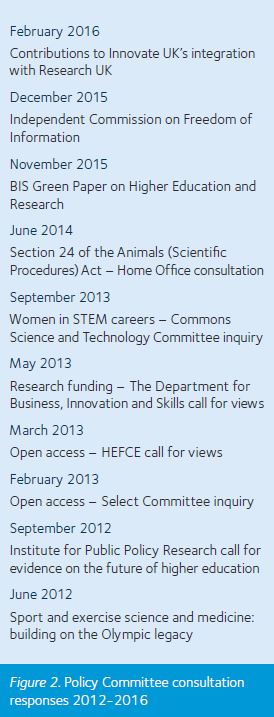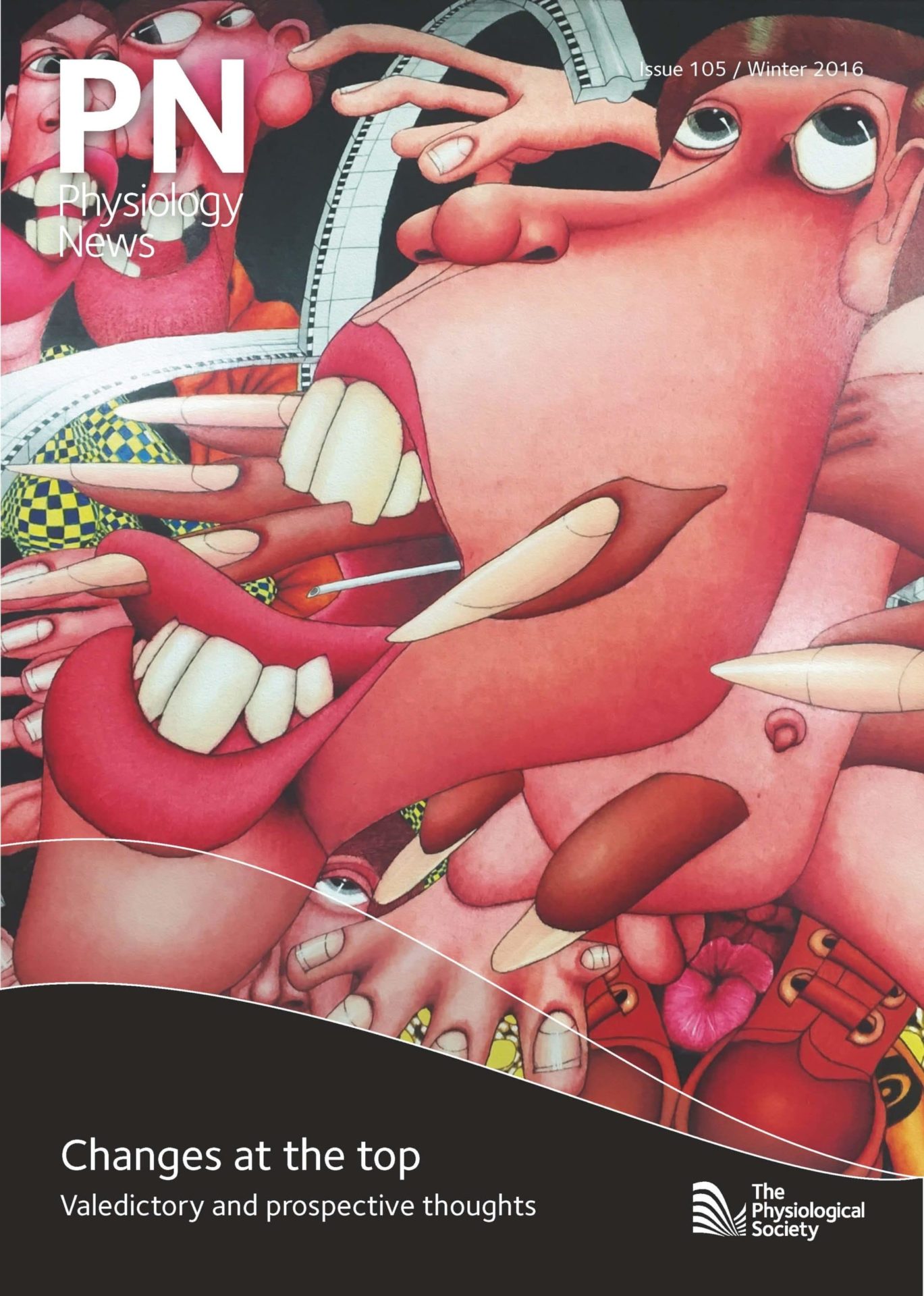
Physiology News Magazine
Chair of the Policy Committee 2012-2016: From start to finish
News and Views
Chair of the Policy Committee 2012-2016: From start to finish
News and Views
Mary Morrell
National Heart and Lung Institute, Imperial College London, &
NIHR Respiratory Disease Biomedical Research Unit at the Royal Brompton and Harefield NHS Foundation Trust &
Imperial College London
https://doi.org/10.36866/pn.105.14
In the 1960-70’s Harold Wilson championed the phrase ‘a week is a long time in politics’, and as we have recently found the political landscape can change very quickly. The impact of these changes is not always immediately apparent; nevertheless, the actions of policy makers within Government (and beyond) do matter. It was this belief that led me to apply to be Chair of The Physiological Society Policy Committee back in 2012.
Four years ago I knew that the Policy Committee was active in responding to government legislation that affected physiologists, in particular supporting the need for essential animal research. I proposed that by expanding these activities it may be possible to raise awareness inside and outside government of the importance of physiology; ultimately leading to an increase funding and career opportunities for physiologists. To achieve this there was a need to increase awareness of the Society’s policy work, and to expand the number of people involved.
Since 2012 much has changed within The Physiological Society. It has entered a new phase, buying its own headquarters (at Hodgkin Huxley House) and appointing a new CEO. The Policy Committee has also changed significantly; it has become a vibrant, influential team of people, working hard to make a difference. This article outlines many of our activities past and present and I would encourage you to read on, and as you do so, ask yourself: is there something you can get involved with?
Health of Physiology
When starting a journey it is necessary to know where you are, before you can move forward. The Policy Committee was therefore pleased at the adoption of an early suggestion to investigate the ‘health of the discipline of physiology’. A steering group of Society Members and external stakeholders, chaired by the Society’s (then) Deputy President, Professor Richard Vaughan-Jones, was formed. The group was the first of its kind to review the amount and scope of physiology research, plus the number students being trained and the location of courses. Data was collected from approximately thirty universities. The legislation affecting physiology was also reviewed. The intention was to use this information to inform the work of the Society, to decide how to support the future of the discipline, and to select areas of priority.
It is fair to say that it was harder than anticipated to produce the Health of Physiology report, not least because it needed to be fitted into all the other activities of The Society. That said, the report was released at the annual conference in July 2016. The overall conclusion was optimistic, with physiology remaining a key discipline and a healthy number of students being trained. The report can be downloaded from the website, and its recommendations are stated here in Figure 1. Please see: www.physoc.org/health-physiology-0
Engaging with MPs
A critical part of the Policy Committee’s work is to engage with policy-makers. sometimes this has resulted in a call to our members to contact their local MP about specific issues. In 2014, the Policy Committee organized a workshop to provide members with more information on engaging with policymakers. The Policy Committee also often works in collaboration with other organizations to widen its network, and strengthen its voice.
In particular, unifying the voice for biosciences has helped in our responses to many consultations (Figure 2).
Moreover, the Policy Committee was delighted when in March 2016 The Physiological Society became an enhanced supporter of the Royal Society of Biology. It is hoped that this link will facilitate closer working in key areas throughout our remit.
Animal Research
The In Vivo Sub-Committee exists in part to respond to consultations on regulation and legislation around animals in research. The Society position statement on the use of animals in research, which the committee have developed, can be found on our website. The Society is also actively involved with the Animals in Science Regulatory Unit of the Home Office and I would personally like to thank Professor Max Headley for all his work in this area. His knowledge and skills have been a great help to the Policy Committee. To find out more about our important work on issues such as the 2015 European Citizens’ Initiative ‘Stop Vivisection’, and the Transposition of EU Directive 2010/63 please visit (www.physoc.org/animals-research).
Supporting Women in Physiology
The Society is committed to increasing equality and diversity in Physiology, and the Policy Committee has supported many initiatives, including responding to the House of Commons Science and Technology Committee inquiry on ‘Women in STEM careers’. In 2013 the Society produced a ‘Women in Physiology’ booklet. Launched at IUPS in 2013, interest in the booklet exceeded all expectations and we ran out almost immediately!
On the 23 January 2015, The Physiological Society marked 100 years since its first women members. To celebrate the achievements and contributions of 20th and 21st century women physiologists, The Society has produced a second book. I am also delighted that in the not too distant future, Professor Bridget Lumb will become The Society’s first female President.

Education Policy
Hardly a week appears to go by without an announcement from the Government on education policy. For many years, The Policy Committee has linked with the Education and Outreach Committee to actively support physiology education at all levels. Within higher education, The Society has led work on the reward and recognition of higher education teaching, chaired by Professor Judy Harris, who has had a huge impact on the field.
In 2014 The Society, in collaboration with the Academy of Medical Sciences, Heads of University Biosciences, and the Royal Society of Biology, conducted a survey of over 250 academics across UK bioscience departments. The resulting report called for an urgent change in the teaching/research culture. In 2015, The Society also published a booklet to raise awareness of the status and valuation of teaching in careers in Higher Education. In addition, teaming up with the think tank Demos, we held fringe meetings at the 2015 Labour and Conservative Party conferences. The meetings aimed to raise awareness of the issues associated with Higher Education teaching. They were well attended, and this engagement route has been used again this year. Then came the Department for Business, Innovation and Skills’ Green and White Papers, with changes that include the introduction of a Teaching Excellence Framework (TEF) to assess the quality of undergraduate teaching at all higher education institutions in the UK. The impact of the TEF is yet to be determined but we are working to positively influence it.
Imagine where it will end…
It has been a privilege to Chair the Physiological Society Policy Committee. The Committee has dealt with a wide variety of issues that are of importance to physiology, and I have learned a huge amount from our members and staff. My particular thanks go to the past and present Policy Staff: Michelle Brook, Ed Hayes, Saranjit Sihota and Henry Lovett, plus the Education Team led by Chrissy Stokes and chaired by Professor Blair Grubb. We could not have done any of this without the support of past Presidents Professors Jonathan Ashmore and Richard Vaughan-Jones, as well as CEOs Philip Wright and Casey Early, and of course all the members of the Policy Committee. I am delighted that the Committee will be continuing its important work in the capable hands of Dr Lucy Donaldson and the Physiological Society Policy Staff.
Above all, I hope I have said something that will prompt, inspire or irritate you enough to take action. The recent vote to leave the European Union will have significant effects on the science sector, some of which are already being felt – I personally have been asked to step aside from a (European/EU) Horizon 2020 application that I helped to develop. The future policy work of The Society will aim to protect physiology research in the new regulatory regime, ensuring access to funding and the success of international collaboration. Sometimes when you start a journey you can never imagine where it will end, but I will continue to believe that if we act together, we can make a difference, although sometimes we have to play the long game.

